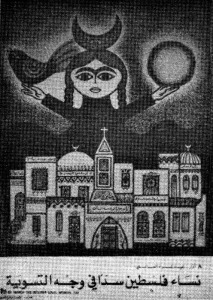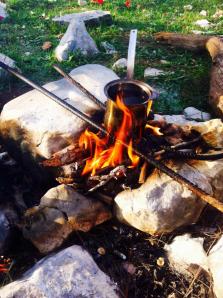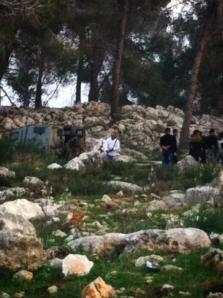*This article of mine was originally published in Norwegian on the newly launched website, Infofada.
Upon reading various Western articles regarding Palestinian women, one notices the tendency of placing Palestinian women as antagonistic to Palestinian men, deeming them as the source of women’s oppression without mentioning how Israel’s illegal settler-colonial project has both added to and perpetuated the violence that they experience on a daily basis. One also gets an image of Palestinian women being powerless, voiceless beings unaware of the oppressive conditions that affects them. Such writings create a false representation of Palestinian women while undermining both their capabilities and their struggle.
Israeli Occupation as the Cause of their Oppression
It should go without saying that Palestinian women experience dual forms of oppression, one from Israel’s occupation and another from their patriarchal society which has become increasingly so as a result of the former. If one were to look into the history of Palestinian women, one could see that the source of their power came from the rural lifestyle that they lived, making them a vital asset to the economy and well-being of the home and society. An additional means of self-empowerment was their crucial participation in national liberation movements and uprisings against the British Mandate and Israel’s occupation. However, due to Israel’s theft of Palestinian land and the signing of the Oslo Accords and how it put an end to or watered down the various resistance movements, a sense of desperation among men who tried to maintain power formed and they used the oppression of women as the foothold in which they can do so. Consequently, women were forced to live a life of domestication where their responsibility was that of a caretaker or as a secondary economic provider.
Therefore, the tendency of putting the blame on the effect (Palestinian men) and not the cause (Israel’s occupation) is to say that Palestinian women experience only an internal form of oppression. It is to say that the external form of oppression that kills, exiles, imprisons, tortures, rapes, starves, and threatens Palestinian women and their loved ones is not oppression after all. Moreover, it is to undermine what Palestinian women and feminists consider a fundamental part of their cause: The liberation of Palestine.
Agency among Palestinian Women
The characterization of Palestinian women as being weak and powerless entities is to provide an inaccurate representation of who they are. Although this is the case with some Palestinian women, there are many who do voice their thoughts and opinions regarding the various things that happen on a national and international level, and who participate as active members in their societies on political and cultural levels despite Israel’s deliberate (and at times successful) attempts to hinder any such doings.

“Palestinian women stand as a barrier in the face of compromise” (General Union of Palestinian Women, 1975)
Unlike people who are privileged enough not to concern themselves with political issues, the politics of Israel’s illegal occupation manages to force itself upon every aspect of Palestinian lives, therefore making the very existence of Palestinians a political act in itself. As mentioned before, since the 1920’s, Palestinian women played a tremendous role in the struggle for liberation as their activities in the past and present range from participating in demonstrations to party affiliations to running for president to being active members in the PLO.
There are two different forms of politics that women engage in: The formal and the informal. The formal participation entails women working in the government and in governmental organizations such as the Palestinian Authority and its various committees and ministries. The role of women in this form was strengthened by women’s rights organizations who lobbied for a quota system that reserved more seats for women in legislative and municipal elections and in municipal and village councils. Furthermore, there is a Ministry of Women’s Affairs that aims to decrease the gender disparity and to amend laws that afflict Palestinian women and discourage them from practicing their natural rights.
However, the participation of women in the informal political scene is far greater than in the formal, as this practice is far more decentralized and local and, therefore, more accessible to women. The major means of political involvement has to do with attending and organizing political demonstrations and protests. Palestinian women often attend the weekly Friday demonstrations that take place in Nabi Saleh and Bil’in, and they also participate in other demonstrations that call for the end of Israel’s siege on Gaza, its continuous construction of settlements, its theft of Palestinian land, its burning of Palestinian olive trees, and its tendency to incarcerate Palestinian men, women, and children under administrative detention. Palestinian women also turn to print and social media to present their take on various events and issues and this includes articles being published on personal blogs and news magazines (there is a newspaper that circulates around Palestine known as “Sawt Al-Nisa’” which is dedicated to creating a platform for women to discuss national and social matters). Palestinian women who engage in such activities either do so in the name of a party that they are affiliated with like Fatah, Hamas, The Popular Front for the Liberation of Palestine, The Democratic Front for the Liberation of Palestine and the other existing parties, or they do so independently as Palestinians.
Palestinian women are known to maintain the many valuable aspects of their culture and heritage in a way that promotes Palestinian economy and preserves Palestinian history. A lot of the cultural centers and organization in Palestine are run by women, such as “In’ash Al-Usra”, that provides Palestinian women with the necessary materials needed to create embroidered dresses and design pieces along with containers and ingredients used for pickling fruits and vegetables, both of which can be sold to the public to increase the income of the household. There are also Palestinian women who participate in dance, singing, and theatre clubs where they learn how to sing traditional and modern songs and dances along with how to act in or produce plays. Palestinian women, such as Fadwa Tuqan and Adania Shilbi, are also known to contribute greatly to the literary scene in Palestine as they offer a perspective that sheds light on aspects of Palestinian society that are generally not covered by male authors. Such action is necessary in today’s context, as there is a deliberate attempt by Israel to appropriate many aspects of Palestinian culture as their own, so any act of maintaining what is Palestinian is an act of resistance.
The intention of this article is not to insinuate that the Palestinian women experience full equality nor is it say that Palestinian women do not undergo hardships because of social repression. The truth of the matter is that occupation and patriarchy have yet to cease to exist. Though if the rights of Palestinian women is truly a concern for the West, then the best way to support them is to help dismantle Israel’s illegal occupation, which is a prominent acting force to the tyrannical conditions that they experience. Projecting a limited, Western understanding of the conditions of Palestinian women is not the way to lend a hand and such actions is neither respected nor tolerated by Palestinian women. Essentially, if one wants to help them, one must listen to them!


